Khamenei visits expo held at high-security compound at his residence

Iran's Supreme Leader Ali Khamenei attended an exhibition at the Imam Khomeini Hussainiya in Tehran on Tuesday, and met with private sector representatives.

Iran's Supreme Leader Ali Khamenei attended an exhibition at the Imam Khomeini Hussainiya in Tehran on Tuesday, and met with private sector representatives.
The event, like a number others recently, took place within the high-security leadership compound near Pasteur Street, which houses both the hussainiya and the official residence of the Supreme Leader, the so-called the House of Leadership (Beite Rahbari).
These venues serve as Khamenei's administrative and ceremonial hub.
On Sunday, Khamenei led the funeral prayers for two Supreme Court judges killed by an assailant, donning a visibly bulky bulletproof vest during the ceremony at the same hussainiya.
Last month, he also delivered a speech on Syria’s recent developments from this secured location.
Khamenei’s recent repeated use of the hussainiya for public appearances suggests an increasing preference for staying within the confines of his headquarters.
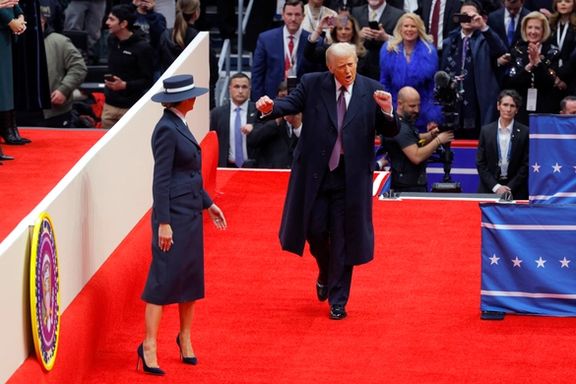
President Donald Trump told hostage families he would have deprived Iran of the money to aid the Oct. 7 attack, putting the Mideast crisis at the center of his first rally since being sworn in on Monday.
"We've got to stop some wars there are some stupid things going on," Trump told thousands of supporters at an indoor gathering in Washington DC.
"Israel would've never been hit on October 7," Trump said, "Iran was broke. Anyone that bought oil from Iran ... China passed, everybody passed."
The newly-minted head of state whose sanctions piled pressure on Iran's oil revenue in his first term and hit Tehran's spending on armed allies in the region, also ordered a deadly drone strike on a top Iranian commander, Qassem Soleimani.
Since that 2020 attack, Iranian officials have blasted Trump in strong terms, but since his November re-election, some quarters have softened their tone and mooted talks.
"They were broke; they didn't have money for Hamas, and they didn't have money for Hezbollah," Trump continued, then addressing the families: "Your sons would be alive, and they certainly wouldn't be incarcerated where they are. It's such a shame."
Later in the evening Trump inked a raft of executive orders at the White House, telling reporters that Israel had weakened Iran badly over a 15-month conflict in the region.
"They're weakened in a different way, the one attack by Israel really set them back - the pagers," Trump said, referring to an attack on Hezbollah leaders' communication devices last year which maimed many and injured Iran's envoy to Lebanon.
"And others," Trump added. "The attack on air defense was a bad attack for Iran."
Israel appears to have knocked out much of Iran's anti-air capability with an Oct. 26 series of air raids in retaliation for an Islamic Republic missile attack on Israel.
Speaking before Trump at the rally, his Mideast envoy Steve Witkoff, who was instrumental in talks which led to a Gaza-Israel ceasefire last week, told rally-goers Trump could solve the region's deepest problems.
"President Trump's leadership has redefined what is possible in the pursuit of progress and stability in the Middle East. his decisive pragmatic approach ensures that even the most entrenched conflicts are met with fresh perspectives and innovative strategies."
Trump counted the so-called Abraham Accords between several Arab countries and Israel as one of the top accomplishments of his first term.
Witkoff said with Trump's leadership he "would be engaging with leaders across the region to find pathways toward sustainable peace and stability."
"Every nation deserves the right to determine its own destiny free from the interference of foreign powers," he added, in a possible reference to regional states in Iran's orbit.
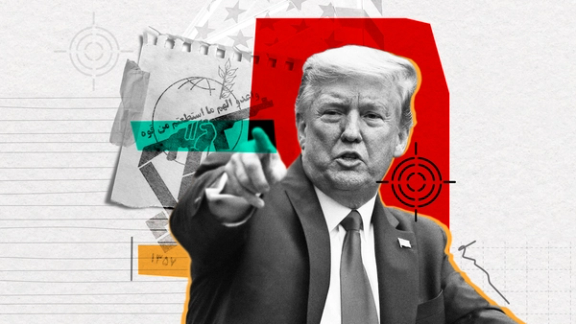
The Biden White House homeland security team in a private briefing urged President-elect Donald Trump’s team to focus on a number of major threats including "Iranian lethal plotting" against dissidents and current and former US officials, Semafor has learned.
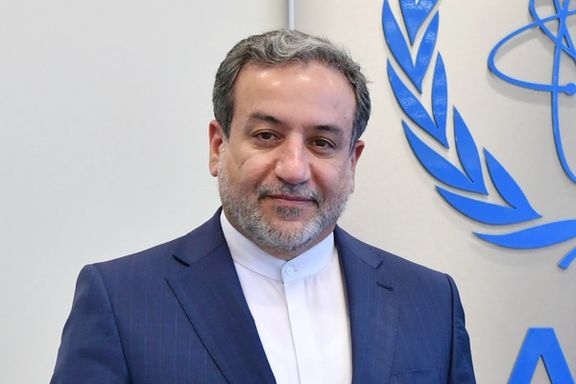
The Telegram channel of Iran's Foreign Minister has shared an image of the US visa stamp on his passport to refute media reports claiming that the Biden administration denied him a visa to attend a UN Security Council meeting.
"Foreign Minister Abbas Araghchi himself decided not to attend the meeting" in New York, the Telegram channel said.
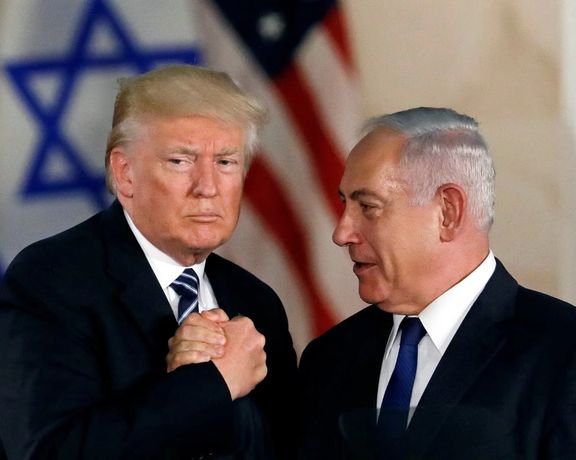
Israel and the United States will work together to defeat Iran and end its regional influence, Israeli prime minister Benjamin Netanyahu said in a message congratulating US president Donald Trump on his inauguration day.
“I am confident that we will complete the defeat of Iran’s terror axis and usher in a new era of peace and prosperity for our region,” Netanyahu said addressing Trump in a video released on Monday.
“You withdrew from the dangerous Iran nuclear deal, you recognized Jerusalem as Israel’s capital … and you recognized Israel's sovereignty over the Golan Heights,” Netanyahu said, reflecting on Trump’s first term and his pro-Israel, anti-Iran policies.
With Trump’s return to the White House, significant shifts in US foreign policy are anticipated, particularly in the Middle East.
Israel's former defense minister Yoav Gallant also mentioned Iran in his congratulation note on Trump's inauguration day.
"Our ties are critical to Israel’s security and prosperity - to the return of the hostages, to the removal of the Iranian threat, to achieving our common goal of dismantling the ‘axis of evil’," he wrote in a post on X.
The Trump administration is expected to take a hard stance against Tehran. Both the president and senior members of his team have promised a return of the so-called maximum pressure campaign on Iran.
During his 2024 campaign, Trump said he wished prosperity for Iran but stressed the long-standing Washington red line that the theocracy must not be allowed to acquire nuclear weapons.
Anticipating potential pressures, some in Iran including senior aides to Iran’s president Masoud Pezeshkian have openly called for talks with the Trump administration, suggesting even that the country’s markets can be opened to American companies.
This has not gone down well with the more hardline factions of the Islamic Republic, who inspired and encouraged by the supreme leader Ali Khamenei, warn against any advance by Tehran toward Washington.
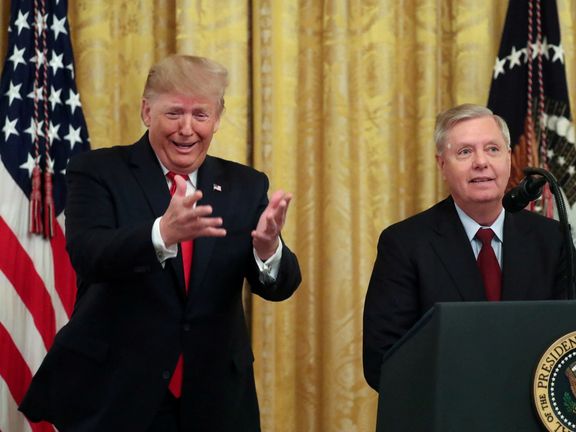
There is no point in negotiating with Iran about its nuclear program and President Donald Trump should instead help Israel bomb it, Senator Lindsey Graham said.
The comments by the hawkish South Carolina senator who is a longtime Trump confidant are among the most direct yet by a senior decision-maker supporting a US military intervention on Iran.
"The next question for the world is what do we do about the Iran nuclear program," Graham told CBS Face the Nation on Sunday.
"With diplomacy, there's a one in a trillion chance you'll degrade the Iranian nuclear program. There's a 90% chance you'll degrade it through military action by Israel supported by the United States.
The veteran senator is one of the biggest advocates of a more muscular policy abroad and is a vocal supporter of Israel and its Prime Minister Benjamin Netanyahu, whom he credited with delivering heavy blows to Iran-backed groups Hezbollah and Hamas.
Trump said in November that Iran "can't have nuclear weapons" but "I’d like them to be a very successful country."
Sworn in on Monday, Trump has repeatedly suggested he is disinclined to pursue regime change in Iran and has not publicly mentioned any military option on Iran.
Graham said he would engage Trump "to take this moment in time to decimate the Iranian nuclear program, to help Israel deliver the knock-out blow."
"(The Islamic Republic) is a religious nazi regime," Graham continued. "They want to destroy the Jewish State, they want to purify Islam and drive us out of the Mideast, it would be like negotiating with Hitler.